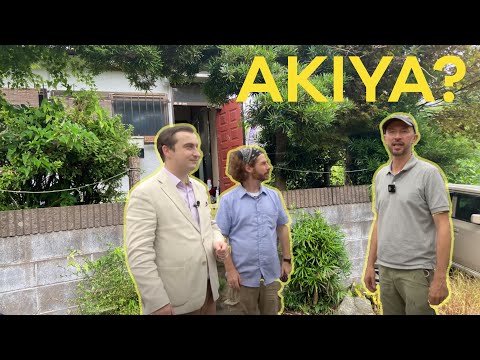Buying Akiya? | Exploring Houses in Rural Japan with Akiya & Inaka

So I'm just heading out to Nagara in Chiba which is about one and a half hours drive away, to meet a couple of guys who've started up a business that helps people find and purchase akiya. I occasionally get messages asking if I could help find a house or suggesting that I should set up a business helping people purchase and renovate akiya. But to be honest, though I've enjoyed the process of buying and renovating our house, real estate or managing someone else's renovation is not something that I'm really interested in doing as a job. akiya is the Japanese word for vacant house. It's made up of the kanji "aki" - empty, and "ya" - house. As we'll see today it's a pretty broad and loose definition. Recently, there have been a few popular
articles on akiya and Japan's 14% vacancy rate. How did that one get in there? But it's not a unique problem to Japan. You see similar issues in many other advanced countries around the world for various reasons. In Japan, vacant homes tend to be mostly
concentrated in rural areas where ageing populations, migration to urban areas, declining property prices, and, perhaps more unique to Japan, a preference for new houses over pre-owned houses. So you have many houses that are simply left vacant, often after elderly people pass away or move to more convenient locations close to hospitals and supermarkets. In many cases the children have already moved away to cities and either continue to occasionally look after their family homes or decline their inheritance altogether, leaving the property abandoned.
Often these properties fall into disrepair and become a blight on the neighbourhood. Unfortunately it's difficult for local governments to force owners to demolish ramshackle properties or properties where the owners can't be traced, so you have government programs like the akiya bank that try to encourage people to purchase or rent these vacant homes. An akiya bank is the catchy name for the municipal listing of properties. It's
often run by the local immigration department that attempts to encourage inward migration from other parts of Japan. In this video we'll visit a couple of properties in the Nagara city akiya bank You can peruse their website to get an idea of what sort of properties they offer and their prices. They're often places that normal real estate agents are not interested in for a few reasons that we'll get into in a moment. Okay, so I'm here with Matt and Parker from Akiya & Inaka, and we're going to check out a couple of houses today and talk a little bit about akiya. Nice to meet you guys.
Great to see you, thanks so much for bringing us on your program and thank you for coming out to glorious Chiba. The first house we looked at was not exactly what I had in mind when i thought of an akiya, mainly because the owners, who were a very friendly elderly couple, still used the house as a second home. But it is listed in the Nagara city akiya bank. All right come on in, might have to turn some lights on. The adventure begins. And so the owner tells us that this house was imported as a kit from Scandinavia, I believe Sweden, but essentially all the lumber, the staircase, everything came in as one set. The only things that are
Japanified are this tatami room over there, and also the roof, which is a traditional kawara, a ceramic style roof. Okay so guys what exactly is an akiya? That's a very difficult question to answer. Actually, akiya can be a lot of things. Obviously,
as you well know, there's the stories of the dilapidated, dangerous and abandoned and all of these, yes, those are akiya. So an akiya can be near anything. It might be a complete dumpster fire, it might be something like this, which is, I don't know what you're thinking exactly about this place, but it's pretty nice. And certainly able to move in straight away.
So an akiya is not very strictly defined, but it's almost like people or the the stories being told about akiya say that it's strictly defined, which is you know, the abandoned haunted houses. But it's much wider than that so there's many types. Essentially a vacant house. Precisely Vacant's the word that I like. How long
have you been running your business? Only about a year now. In fact it's almost exactly a year. We've been working in real estate, dabbling in real estate in various capacities for probably about eight or so years now, so we're experienced but so far as actually having an official business offering? That's almost, if not perfectly, one year old. It started mostly, if not entirely, due to the coronavirus pandemic. So Matt and I both had a background in
real estate one way or another. Me, more on the transaction side and helping both individuals and also businesses in Japanese real estate transactions, and on Matt's end working with local akiya banks and trying to catalog the vast amount of information that exists about these sort of abandoned or semi-abandoned buildings in Japan that local governments are trying to get into the right hands. So we decided to come together in the middle of the pandemic, honestly because there are a lot of our colleagues and friends who were really feeling bummed out by the situation, not being able to go anywhere, sort of afraid for their family, afraid for you know what's going to happen, where is this pandemic going to go? This is of course still when there was less information about what coronavirus is etc etc, but people were starting to reassess their focus on the city and living in the city and having their livelihood and their family live in the city because of the pandemic, and of course not just because of the virus, but also just more of a quality life sort of situation. - Are these mostly foreigners or Japanese too? - Both. Of course at Akiya & Inaka our main target audience are foreigners, both those living in Japan and of course those living abroad who are interested in purchasing Japanese real estate, but we've also had interest from Japanese customers as well. Essentially what we do is, instead of
focusing on the real estate deal side of the equation, we focus on the research and the support and the consulting that's involved in helping our clients figure out where they want to be and what sort of a place will help them achieve their goals, whatever those may be. You'd be surprised at how difficult it is to figure out where you want to be. This was the second house introduced to us by the akiya bank. Now this one was definitely unoccupied and has been vacant for about 10 years or so, though it is looked after from time to time. All right, you missed the head. Spooky And it's got like a noose around it too.
You probably couldn't get me to walk around this akiya at night. - How much is this one? - Four million yen - Four million yen? - Yeah 40 000 USD Still think a little bit high. I haven't seen inside yet but this is more expensive than my house. - Oh really? - Yeah mine was three million. Let's have a look inside Is there more creepy stuff inside? No. Well, not yet.
But there's a very large fan. Very large Like larger than a normal fan. Ah, this kind of fan. I was picturing an electric one.
That's a nice fan though. That's kind of cool Check out that refrigerator. Go on, have a look inside. I bet there's still stuff in there.
Not in there. Have a look in the main section. Is it beer? Tsuyu (sauce) Not a beer. Not a beer. Disappointing. All right, just getting back to your company, how do you differ from a real estate agent? So you're a consultant? And so you're looking for properties on behalf of clients, sorting through properties like this filtering through? Yeah, and then on top of that we end up coming on board as a buyer's representative. With regards to negotiations and just various official talks and documentation that also needs to be handled, sorted through, understood, possibly translated, things like that. That's also where our experience comes in. That's again, as we've said before,
that's something that you can technically do by yourself if you like, but it's fraught with loopholes and various other pitfalls that introduce quite a bit more risk to the purchase process. Instead of being a real estate broker we've decided to take the consultancy route so that we focus on finding the property, helping the client purchase the property in terms of the assistance, but not the actual transaction support, and then after the transaction happens helping with any after sales support. So instead of paying us a commission our services cost flat fees. And so in exchange for the fact that our clients will end up paying more than with a traditional real estate agent we give that extra peace of mind, we go the extra mile when it comes to due diligence and research, and on the front end that means the client spends less time looking at a bunch of properties that don't fit the bill because we get paid to do research per property based on specific criteria the client gives us. And on top of that discussions with the client about what they're
looking for. So essentially we're the hired guns who will scour Japan for the property that meets the client's criteria. The clients have to pay for it but they don't have to, you know, do all the research that goes into that and go to maybe dozens or hundreds of properties to discern what separates the good ones from the bad ones. What's the market value. We're basically private eyes, detectives. I think private eye sounds cooler. What about akiya hunters? Yes, we are the akiya hunters.
But I mean that's it. There's a lot out there, there's a lot to sort through, you can do it on your own if you want but it's gonna take a while. You'll probably be frustrated, you'll figure out how bad the systems are. Give us your pain as well as money. We're not even talking about the registration stuff, we're just talking about finding a property that's viable. Then you have to make sure the property is free and clear. That there are no registration
issues. Japan does have this nationwide real estate registration database which is very nice and convenient but especially in the inaka (countryside), and especially when people have passed away or there's some inheritance situation going on the situation is oftentimes less clear than you would imagine. So before you purchase property you have to do all that due diligence on top of making sure the property itself is viable to make sure that there are no problems in obtaining full ownership of the property with no disputes. Is that part of the reason why a standard local real estate agent doesn't want to deal with akiya? Exactly, and I mean I think we talked about this over lunch, but real estate agents in Japan pretty much across the board work on a full commission model and the standard industry commission fee is three percent. And if you're trying to sell condos in Ebisu or elsewhere, in Minato-ku, in central Tokyo, three percent of a million dollars, two million dollars, three million dollars is a good commission, and the properties are close to each other and they're all pretty straightforward.
However if you have that same customer walk in the door and say find me a $40,000 house in Chiba the enthusiasm level will be different, I promise you. So really on the front end what we can offer our clients is the same level of service and enthusiasm no matter what their budget is because our motivations are different, our business model is different, and you know this is what we specialise in. The weirder the better. I found a head.
I wouldn't mind interviewing Yasujima-san. I want to know exactly what the role of the akiya bank is. It's very unclear. So that one was owned and and semi-occupied. The previous one. What I didn't quite get was why it's at the akiya bank, not just at a typical real estate agent. Oh I actually know the answer to that So akiya banks exist all around Japan What's the deal? The interesting thing about akiya banks is that they are usually a unit of a local ward office or a local town office or some sort of administrative body, and what they do is they're this database of abandoned houses or semi-abandoned houses in the local area. Of course the definition of akiya is a bit wishy-washy so you've also got houses that are still being used as second houses like the first one we saw.
We've also got houses that are maybe still being lived in even, but they're about to be vacated and so akiya bank is almost just like a countryside underutilized real estate bank. And so the interpretation of akiya is sort of vague in that regard. In addition to that they're not real estate agents so they have a database with pricing information etc etc about all of these houses in their local district however if you actually want to buy that property you've got to talk to the owner and maybe they have a real estate agent who they want to use, or maybe you can use a real estate agent who you've been introduced to.
The fact that these akiya banks exist is very important because some local people, like I think it was you or somebody else said to me that their relative had a house in Gunma prefecture and they tried to list it with a local agent. The local agent said nobody wants to buy this, get out of here. Was that you? That's what they accomplished. And so basically akiya banks are like the real estate website of last resort. So just a change in topic, just I think would be of interest for quite a lot of viewers. How hard is it to find a decent kominka/minka style house. I mean the traditional Japanese house. Yeah, there's a lot of people, so I mean a
lot of people, who when they think about akiyas they're also looking for a traditional style Japanese house as well as akiya. Yes definitely. You see so many minka when you drive through the countryside and you imagine that most of the people living in them are now pretty elderly, probably in their 70s and 80s. So many of them will be coming onto the market. It's interesting with the kominka.
To the sort of uneducated observer, and not uneducated in like a rude sense, but they're just not that familiar with Japanese architecture, a lot of the houses you see in the countryside look like proper kominka and they probably expect like dirt floors and maybe there's some, you know, thatched roofs and whatnot, but actually a lot of those houses weren't built that long ago. Well, like my house. Exactly. So the majority of these sort of traditional Japanese style houses that we see, I mean lots of them, were built in the 50s, 60s, 70s, 80s. And if you want a real like kominka, you're looking at something that's a hundred plus years old.
So if you want a house like that, like the real deal, either you've got to find one that's been very painstakingly renovated and kept up to code by someone with a lot of money, or you've got to find one that's basically been abandoned for a long time and you've got to do all that work and spend those hundreds of thousands of dollars, or you can find a kominka that's been relocated. We actually found a really cool one. Maybe we'll go up there sometime. I think it's still on the market in Tochigi. I was moved from Aizu Wakamatsu in Fukushima prefecture, a 400 year old farmhouse, and in around the year 2000 a local builder in Tochigi moved it to Sano city, and has this beautiful 400 year old bones, but also has modern conveniences as of 20 years ago. It's pretty nice so when you're looking for a kominka style house you have to ask yourself do you want to be a purist and get 100 year old farmhouse and of course deal with all of the maintenance issues or the high price that's going to be associated with that, or do you want to get the traditional style but maybe something that was made 50 years ago or 60 years ago, 40 years ago.
Obviously it's not going to be as authentic as the real deal but it's going to be a lot easier to live with. The minka from the late 80s during the bubble, they were built pretty well. Especially in the countryside you have to understand that through the 60s really into the 90s, I mean obviously 1989 when the bubble burst, but around that time period, through the the 70s the 80s the 90s, even in the countryside there was a lot of money, a lot of wealth, and people had local businesses and they're very successful and they made a lot of money and some of them wanted to kind of show off so they built these massive traditional houses because they're proud and that pride really sort of translates into some of the more very large kind of spaces. I mean traditionally you have like these six mat (tatami) rooms but sometimes you'll see in these big minka houses you have 20 year mats or 30 mats, and I mean to someone who had grown up in early post war Japan it was palatial, it was like all of a sudden you come to Las Vegas and you see the Venetian, like that sort of really extravagant style. And it's funny because our clients look at that and they think well man I guess some Japanese people just like nice houses. No, the people who built this were actually
pretty rich, but of course 30, 40 years later their kids don't want to live in a Japanese house, they don't want to live in, you know, Ibaraki or Tochigi or Saitama or whatever. They want to live in Tokyo. They don't want to maintain a big house. Exactly. And they don't see. They don't see. Of course I mean this is a big thing with generational shift, the kids don't see what their parents envisioned and honestly even if it's good they can't appreciate it because you know it's just been whatever to them their entire lives. Thanks to Matt and Parker from Akiya & Inaka for organising the visit. You can check the link to their website in the description.
Also a big thanks to Yasujima-san from the akiya bank in Nagara for arranging the viewings of the properties. She was a bit shy and didn't want to appear in the video, though sharp eyes will have spotted her very briefly. Thanks everyone for watching and I'll see you next time.
2021-10-01 15:04


